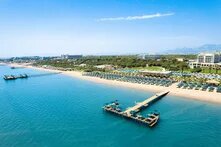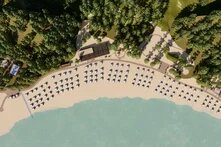Yasemin and Cemal, two small business owners residing in Çıralı, are witnesses to the rapid and uncontrolled transformation of this small town. They believe the area needs more trees, not more roads and hotels, and they question the concept of industrial tourism.

Along the densely built-up coastline around Antalya, it is becoming increasingly difficult to find places that are not characterised by hotels, clubs and private resorts and other mass tourism infrastructure. Nevertheless, such places still exist: the utilisation of the region's tourism potential has not bypassed them either, but the implementation was different, often closer to nature. One of these places is Çıralı, 80 kilometres south of Antalya. Surrounded by orange groves and fields, the village is often used as a prime example for alternative, ecological tourism. However, the fact that Çıralı still exists without the typical hotel complexes is largely thanks to the local population, their protests against large-scale projects, other activist initiatives and the understanding of environmental protection. Nevertheless, the fragile ecosystem of the village is still under threat. In addition to the ancient village of Olympos, loggerhead turtles also hatch on the beach.
Harmonising these natural and archaeological conditions as well as agricultural use with touristic expectations and developments remains a permanent challenge.
As mentioned, one of main reasons a path of tourism that less environmentally harmful is pursued, is the awareness on this topic within the local community. Yasemin, who owns a small restaurant on the beachfront of Çıralı, remembers her first contact with environmental issues:
“When I was 15, I was working in a restaurant to improve my English. While I was there, I met volunteers from different countries. They were working on protecting the beach and the sea turtles. It was around 25 years ago, my first contact with nature protection. I do still remember how we used to clean up the beach some mornings and chat during the lunch breaks. Foreign volunteers and local people worked very well together at that time.”
In the beginning, nevertheless, there were also calls for different - today one might say more aggressive - forms of tourism, the local families and farmers who became pension owners realised quickly that the special place in which they were living was worth protecting. After all, it is this closeness to nature that still draws tourists to the village to this day. Cemal, lived most of his life in Çıralı and who owns a small shop there, remembers the foundation of the Çıralı Ulupınar Environmental Protection Cooperative, which even today, 24 years later works on organic farming and related tourism activities in the region, while also implementing nature conservation measures.
Another incident, that showed the will of the local community to protect their home, occurred in 2012. The village was startled by the news that the amateur football club of the regional forestry office had been given a training ground in Çıralı and had quickly leased it to a tourism entrepreneur.[1] Thinking back to this incident, Yasemin remembers that she was terrified: “It meant to me end of our life in Çıralı, the end of Çıralı, the end of family run businesses.” Quickly after the news broke out, the villagers organised protests, blocked the bridge at the village entrance and organised sit-ins. Back then, Cemal participated in the protests, as did Yasemin’s father, who is a farmer. As one of the protests actions, local women and some female tourists did yoga on the street, as Yasemin recounts. “The village ladies with their authentic outfits, took their Kilims instead of yoga mats and did yoga in middle of the road, blocking it to construction vehicles.” The protests back then were a mixture of local people of all ages and genders, some restaurant workers and tourists participated as well. In the end, following all these protests, the Ministry of Forestry stopped the project.
Even though the local community knows of the great importance of protecting the nature around them, it is inevitable that there have been developments in the past years, that are working against the aim of environmental protection. Sibel, originally from Ankara, who has been living in Çıralı for many years now, brought up the increase of accommodations in the village, with a decrease of quality. She adds that there are now more hygiene issues and an increase in careless behaviour for customer satisfaction. To this, Cemal warns:
“If Çıralı continues like this, we will face many problems in the future. Above all, the infrastructure system has not yet been built here because the land utilisation law is not yet in place.”
Yasemin adds, that due to the Internet and some hype on social media, Çıralı has become more popular among a wider group of people, that is not always aware of the environmental particularity of the place.
“The internet made Çıralı very popular, which is scary for me. I think we are on the edge these years. We can’t handle more people here, otherwise it will look like Kemer.
Another issue that Cemal and Sibel see is the management of hotels and restaurants by unqualified business owners without environmental awareness. According to Cemal, even though most villagers see the importance of environmentally sensitive tourism, some businesses are more concerned about earning money quickly. He regrets that there is no full unity in the village community when it comes to business practices and environmental priorities.
Besides decisions that are taken by restaurant owners and hoteliers in Çıralı, most of the bigger scale planning processes take place on the regional or even national level. Since 2021, the Ministry of Culture and Tourism has the main decisive authority.[2] When asked about the development of Çıralı, Yasemin brought up, that there is a city development plan in the making, that would lead to the extension of roads. What makes her especially sad, is that according to the drafts she saw, her dads garden with over 100 fruit trees would have to be cut down in order to carry out the construction works. She asked herself: “I wonder do we need more roads? Or do we need more trees to live?” In her opinion, the city development plan should have been done more carefully. She adds: “People design it in Ankara and Kemer without really knowing the situation here.” Even though her father wrote many complaints to the responsible office, his interventions were ignored and negated.
This lack of participation of the local communities is sadly not an exception, but more so the rule, as can be seen across Turkey. Regarding this seemingly inconsiderate planning, Sibel found clear words:
“Local governments only look out for their own personal interests and do not display a profile that considers the interests of the people of Çıralı. All kinds of licenses have been given to businesses, from tourism certificates to liquor licenses.”
What bothers her the most is the fact that although there is continued investment in touristic development, the foundations for all this, such as an adequate sewage system, are lacking.
Despite all these negative developments and stressors for the local ecosystem, all three also see positive aspects of tourism and its development in the village. Of course, this is hardly surprising, as all three earn their money this way. But Yasemin in particular makes another point. According to her, tourism brought different cultures, perspectives, approaches, lives together and created friendships. She added:
“Tourism has changed my life in a positive way. Because of it I managed to earn money as a student and went study in Ankara and England. When you live in a small village, income is not enough to support the education fees. I am a free, independent women today because of tourism.”
When asked about their wishes the future of Çıralı, Sibel, Cemal and Yasemin were quick to answer. Cemal hopes for a reduction of hotels and pensions in Çıralı, paired with measures to attain a higher qualification and environmental responsibility of business owners. Yasemin has multiple wishes for her “nest”, how she lovingly calls Çıralı. She, as does Sibel, wishes for the next generation to have the same connectedness and access to nature as she had growing up. That is why she hopes for the village to stay “green and blue, with orange blossom in spring and horizontal buildings”. Regarded the city development plan, she hopes, that it will be amended and consider the voices of the local community. To have a bigger impact in making sure these wishes can become reality, she would like to be the Muhtar of the village one day, to help Çıralı to be more an environmentally friendly village. “Nature is our future”, as she puts it.
Until then, there will be other obstacles in the way that will need further action of the villagers and local initiatives. If in the next years further construction will take place, it will again most likely be up to the local community, to observe and protest harmful interventions. Yasemin however is not very optimistic when it comes to a future participation in protests. She said: “I believe half of Çıralı will not protest this time. If there is a city plan somewhere, the value of the land will be higher. In a case like this, buildings like pensions and houses will be legal and registered, which is currently not the case here. Some people might think it is a good way.”
In the current uncertain economic climate, the prospect of security and financial gain could therefore outweigh the desire to protect the environment for some. Only time will tell whether this assumption becomes reality. What this shows, however, is that even in protected areas the negotiation between financial gain/safety and environmental protection continues. It should therefore be up to the public authorities to ensure that the residents of Çıralı are not faced with such a choice in the first place.


